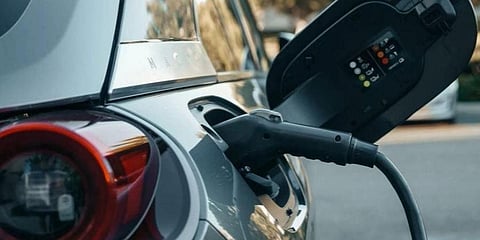The future is of EVs and Elon Musk triggered it
A couple of weeks ago, the first electric vehicle (EV) charger was set up in our Mumbai housing society in a discreet corner near the tennis courts. Most of the 350 resident families own multiple cars, some of them Porsches and Bentleys, and there’s even a Rolls Royce. But not a single one owns an EV yet. A dipstick survey revealed 3-4 residents had placed orders, and others were on the way there. That little EV charging station in the corner was the sentinel of the future.
In deference to the revolutionary role one man has played in disrupting the polluting, fossil-fuel burning auto industry, and for transforming the electric car from a crackpot gadget to a mainstream product, the Time magazine has crowned him Time’s 2021 Person of the Year.
Announcing the award to Elon Musk, co-founder of Tesla Motor Co, Edward Felsenthal, editor-in-chief and CEO of Time, said: “2021 was the year that electric vehicles finally came into the mainstream and that Tesla became a trillion- dollar company, one of only a handful in the world. It’s a market that Musk almost single- handedly created, seeing long before others the demand for clean- energy transportation.”
The recognition has come not by chance in a year when the world climate crisis has become an issue of mass unrest. The automotive industry, which once scoffed at the EV and resisted emission restrictions, is today scrambling to catch up with Tesla.
The Financial Times of London quickly followed Time magazine. Naming Musk ‘Person of the Year’ for his role in pushing the automobile industry to an all-electric future, the British daily wrote: “Even if Tesla was somehow to collapse next year, Musk would have transformed one of the world’s most important industries in ways that could have profound implications for governments, investors - and for the climate.”
Disruption and engineering
The reason everybody — Wall Street, car users, the government — loves Musk and Tesla is because they combine good engineering with a vision of the future. Nothing is sacrosanct, disruption of old legacy is the way forward; and growth is at lightning speed. Traditional automakers grow their top lines at less than 3% a year on average, Tesla’s top line is growing at more than 60% a year.
An analysis in ‘Wards Auto’ compared Toyota and Tesla in the way they handled product development. Says the auto analyst John McElroy: Toyota freezes the specifications of a vehicle a year before Job One. And then there are no design changes until two years after the start of production. Under the Toyota doctrine, design changes introduce variability, and variability leads to quality problems. Not Tesla. It doesn’t freeze specs. Just the opposite. It makes design changes on the fly. And it mainly makes those changes — this is a key point — to take cost out of its cars.
Tesla’s electronic architecture is a prime example. The architecture in the Model X worked just fine, but two years after it came out the Model 3 debuted with an entirely new architecture. Other automakers would never do this. Once they’re done designing a new architecture, they won’t touch it again for a decade.
Everybody’s in the race
For years, Tesla ran as a loss-making company; and almost went bust on several occasions with no money to pay its employees. But Elon Musk was sure the future was his. It was only in 2020 that the company reported its first full-year profit, a feat 18 years in the making, since it was founded in 2003. For the year gripped by pandemic, its net profit was $721 million, in contrast to a loss of $862 million in 2019.
Musk has set the pace. By 2030, every fifth car will be an electric vehicle. The old opponents of the EV are today the biggest investors. Volkswagen has announced an investment of $83 billion in digital and EVs over a 5 year horizon. By 2030, EVs will account for 50% of its sales in the US, 70% in Europe and 50% in China. Mercedes Benz will pump in $46 billion to develop EVs over the next decade, and 50% of its sales worldwide will be EVs by 2025. Ford Motor Co will invest $30 billion in the next 5 years, and EVs will account for 40% of all sales by 2030.
In India, EVs have been slow to take off. Poor quality and over-priced models have not been able to impress the consumer, and the infrastructure of charging stations and maintenance has crawled over the last decade.
Auto pundits predict by 2026 about 12% of the auto market will be cornered by EVs. But these are all shots in the dark. The real big will be when Elon Musk’s cars begin selling. It is Tesla’s launch in India which will create the aspiration to own an electric car, and in the whirlwind others in the league will benefit.
12% of auto market to be cornered by EVs
Auto pundits predict by 2026 about 12% of the auto market will be cornered by EVs. But these are all shots in the dark. The real big will be when Elon Musk’s cars begin selling. It is Tesla’s launch in India which will create the aspiration to own an electric car, and in the whirlwind others in the league will benefit.

